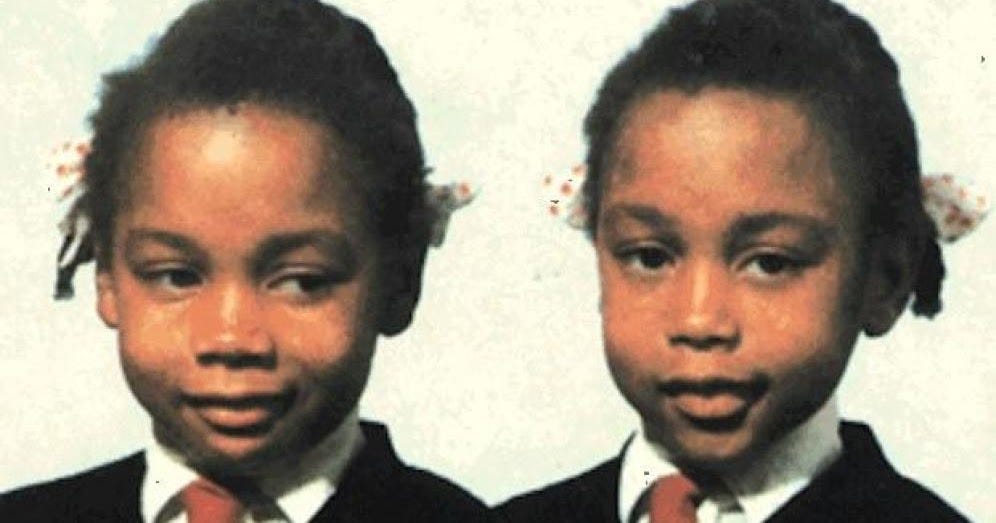
True crime as a genre relies on heightening the lurid, creating the folk devil, and ignoring the interiority that would blur the lines between Us, the law-abider, and Them, the criminal.
Take June and Jennifer Gibbons. They’ve become synonymous with the ‘evil twins’ trope, defined by their refusal to talk to anyone but each other, becoming the youngest women in Broadmoor, and Jennifer’s tragic, mysterious death. Can the podcast, homeland of true crime and its sensationalism, bring a more nuanced take to their lives?
It can if you talk to the surviving twin.
The BBC Radio Wales series June: Voice of a Silent Twin finished its eight-episode run in February 2024. A range of voices are included, but none rise above that of June Gibbons, now in her sixties. She and others help to bring unexpected angles to her and Jennifer’s story.
For one thing, they did try to talk. Episode One enters the girl’s childhood, where their attempts to communicate were met with incomprehension. “They thought we talked a different language,” June recalls. Rumours that the twins made a youthful pact to stop speaking are dismissed by June as a “fairytale”. Even June doesn’t seem certain how their unusual behaviour began.
In a later episode, Dr Chinwe Obinwa suggests the twins would have been treated as neurodivergent in the modern day. It would explain their speech impediment, but their muteness appears to be the result of justified frustration. There’s only so many times you can be told to speak up, repeat yourself, be clearer, what, what did you say? June and Jennifer’s enmeshment comes as no surprise. Who was there to untangle from each other for? Who else would understand them?
Another surprise was the additional context given to their crimes. The title of Episode Four, ‘Psychopathic Arsonists’, is the message the media repeatedly screamed out about the twins. Broadcast clippings from the Eighties are woven through the episode, branding June and Jennifer “terrible twins” on an “extraordinary rampage of crime”. Emphasis was placed on their Blackness, their motives assumed malicious.
Instead, as June tells it, their stint of petty theft and arson was an almost-typical case of teenage angst. They felt isolated from society, betrayed by American boys that loved and left them, bored of life. “Why do this? Nothing else to do”, a teenaged June writes in her diary. It’s the type of youthful alienation often romanticised in fiction – Holden Caulfield et al – but off the safe space of the white page it’s as uncontrollable as fire through a tractor shop.
Even so, their revenge was bloodless. Journalist Marjorie Wallace points out that the twins checked to make sure no one was in the buildings they set ablaze. Their last act of arson, causing £100,000 worth of damage, is described by June as the “finale.” One last spark of adolescent defiance, leaving no casualties behind.
This only makes the sentence handed down to June and Jennifer more disturbing. To be a white man and get into Broadmoor, you need to rape and murder at a rate the authorities can no longer ignore. As a young Black woman, all you must do is confuse people.
Because let’s be clear. Teenagers committing arson and petty theft are usually sent to young offender’s institutes, or for a wake-up stint in ‘grown-up prison’. It was June and Jennifer’s muteness, their refusal to behave or explain themselves in a way that white neurotypical society understood, that condemned them to Broadmoor for twelve years.
This is a heavy series, focusing on how the twins were betrayed on the axis of gender, race, and neurodiversity, but there is lightness in between. One of my favourite parts was the reading of June and Jennifer’s fictional writings. In their teenaged isolation, they were more productive than some writers are their whole lives, churning out novels, short stories, plays.
Actors Bethan Mary-James and Olivia Forrest bring extracts to life with warm American accents (the twins were obsessed with Malibu). A Pepsi addict anticipates his “cool, fizzy” hit sliding down his throat. A young woman in a pulsing discotheque watches the crowd dancing “like peacocks.” Their stories are strange, sensory, unique in style and storyline.
These aren’t the words of “psychopathic arsonists” being plucked from their diaries to be read out in court. What we’re listening to are the words of girls. Intense, vulnerable, entwined in a relationship both freeing and constrictive. Including their writing humanises June and Jennifer, turning the horror of the “terrible twins” into tragedy.
It’s easy to project our own feelings and explanations onto people we see as ‘different’, particularly when they don’t have the ability or power to speak back. In June: Voice of a Silent Twin, June Gibbons is given the time she deserves. This time, no one is asking her to repeat herself.
June: Voice of a Silent Twin can be found on BBC Sounds, Apple Podcasts, Spotify, and other podcast platforms.


This really is heart breaking. It reminds me of that psychological experiment where they separated twins and triplets.
What a heartbreaking story